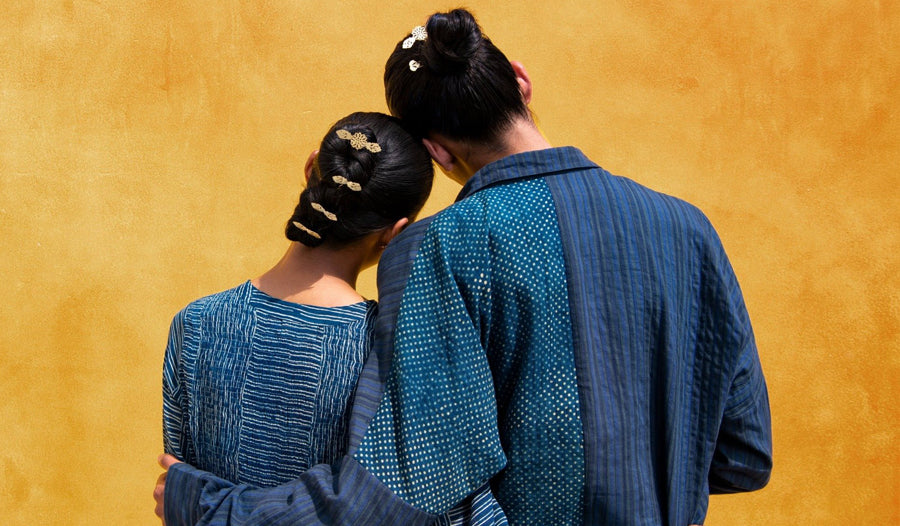
Introducing the Selvedge World Fair Artisans

We are excited to introduce more of the participants in the 2021 Selvedge World Fair. The Selvedge World Fair will take place online on 31 August - 5 September, 2021.
Indigene / Textile and Clothing Design / India
Indigene is a conscious clothing label. A strong believer in sustainable design and working with communities, Indigene speaks of and for artisans, their skills and their challenges. Indigene was started by designers Ruchi Tripathi and Jaya Bhatt, textile design graduates from Delhi’s National Institute of Fashion Technology, who with a passion for traditional textiles and handcrafted techniques shape the company and guide its development.
Indigene Craft concentrates on classic silhouettes, ease, comfort, and all day wear-ability in their clothing. They use natural textiles such as hand woven cottons and silks from West Bengal, and wool from Himachal. Their prints are co-created with Ajrakh printers from Kutch, while the hand-embroidered kantha detailing is the work of a small group of migrant women who have settled in Delhi. Indigene's aim of working with multiple techniques on one garment is challenging as it involves moving the garment to different parts of the country according to where the artisan community is based, but therein lies the uniqueness of the work they do, ‘holding as many hands as possible to complete the circle of an Indigene garment’.
Watch their story in the video above or on Vimeo here.
 Mexican Dreamweavers / Backstrap weaving / Mexico
Mexican Dreamweavers / Backstrap weaving / Mexico
Mexican Dreamweavers is a non-profit organization that supports the Tixinda Weaving Cooperative in Pinotepa de Don Luis, Oaxaca. The Tixinda weavers produce cotton huipiles, posohuancos and rebozos, as well as textiles for homeware–table spreads and runners, bedspreads, throw pillows, placemats and napkins.
The Tixinda weavers use 100% cotton and natural plant and animal dyes, including one very rare and sacred colour tixinda purple dye. Tixinda purple is sustainably milked from the endangered tixinda sea snail (caracol purpura pansa), the exclusive cultural patrimony of the men of this Mixtec town. Only 15 men on Earth still practice this ancient dyeing technique and 'tixinda' may soon disappear if conservation efforts to protect this endangered sea snail are not successful. The primary colour palette also includes blues and blacks of indigo and the red cochinilla derived from a beetle that lives on the nopal cactus. They also work with other plant dyes such as the gold pericon, the yellow sempesuchil and the barks of various trees.
The Coastal Mixtec Oaxacan weavers are one of the last groups in Mexico to grow their own cotton, both white and native brown coyuchi, spin it on a drop spindle, dye it with natural dyes and weave it on backstrap looms. They grow the native brown and green coyuchi and white cotton.
@mexicandreamweavers

Yarn and Yathra House / Weaving / Bhutan
Yarn&Yathra House, based in Thimphu, the capital of Bhutan, is a textile company producing handmade local goods and products using various types of wool. Their weaving house was established in 2016 and from then onwards they have been successful in meeting the needs of both of their domestic and international clients from all over the world including the UK, France, USA and Japan. Their products can be basically thought of as a fusion of traditional and contemporary designs. Their assorted line of collections are all made out of Yathra, a thick, hand woven textile made from wool with intricate traditional designs serving the needs for interior home decors, attires and accessories. Other beloved products include rugs, bed throws, bed covers, cushion covers, pillow covers, sofa covers, curtains, table mats, shawls, scarfs, jackets, vests, purses, clutches, shoulder bags, satchels, backpacks, laptop bags and laptop covers. They have recently started producing fabric for our national dress (Gho for men and Kira for women) and a special type of belt that needs to be worn with it.
Learn more at @yarnandyathrahouse
Hannele Köngäs / Wool producer, dyer and weaver / Finland
Hannele Köngäs is a weaver, plant dyer, and wool enthusiast. Her roots are in Lapland, but she lives and works in South-Western Finland.
Hannele worked as a teacher specialising in hand weaving, textile history, and historical textile techniques, all which informed the artistic approach and methods that she uses today. Hannele opened her own weaving studio, Waveweaver's Wool, in early 2000. The two materials that are most important to her work are Finnish grey wool and horsehair. Next to her studio, Hannele has a dye kitchen where she dyes her own fibres with plants. Finnish nature is not just a source of inspiration for her. A commitment to sustainability and desire to protect its fragile ecosystem in which she lives guides every step of her working process. Have you ever felt the textile of woven horse hair?
Learn more about Hannele story in the video above or at @hannelekongas

Kendaka Upcycles / Textile Upcycling and Crochet / Egypt
Kendaka /ke:ndækᴧ/: a name historically given to Nubian queens who were strong, brave and wise, much like the women artisans who creatively upcycle textile, glass and plastic bags into creative products.
Kendaka upcycles waste into functional and creative products. Kendaka artisans are passionate about three things: waste reuse/upcycling, empowerment of women, and social commitment. Kendaka creation takes place in a small factory in Badr City, an industrial suburb of Cairo, that is set up by women for women. It combines the passion for empowering women in underprivileged areas and the drive to reduce the harmful environmental impact of waste in Egypt. The space allows the women artisans to design their own products and experiment with new ideas and techniques.
The main technique the women artisans use for textile upcycling is crochet, which is the most common handicraft skill used in the area of Badr City, where the factory is located. Textile leftovers of clothing workshops and textile factories that is normally waste, is upcycled by Kendaka artisans into a variety of homeware products including tableware like placemats, hot food coasters, basket sets, plant pots, storage baskets and bags. The artisans are continuously adding new items to the product portfolio. Kandaka is an ethical business working to become sustainable and independently run by the creative Kendakas.
To follow the story of Kendaka Upcycles, find them on social media here.

Takayuki Ishii - Awonoyoh / Indigo Dyeing / Japan
Takayuki Ishii is an indigo dye artisan who was born in Kanagawa Prefecture, Japan. He currently owns a workshop in the mountainous area of Kanagawa Prefecture, where he runs an indigo dyeing company awonoyoh using traditional techniques and materials. Takayuki started contemplating a more sustainable society after the nuclear power plant accident during the 2011 Great East Japan Earthquake and immediately thought of indigo dyeing. Polluted water used in chemical dyeing flows through the river to the sea and destroys the ecosystem. However, the indigo dye that he uses is a sustainable and natural pigment that can become fertilizer for the land or food for the fishes.
Takayuki studied indigo dyeing at an indigo dyeing workshop in Tokyo, and then visited many workshops in different parts of Japan to acquire even more knowledge and techniques on indigo. He also learned and mastered all the procedures necessary for traditional Japanese textile dyeing including yarn, fabric, katazome, shibori, tsutsugaki, batik, and others.
Currently, there are only six artisans who produce raw material for indigo dye (sukumo) in Japan. The aging of the Japanese population, which has become a major social problem in Japan, has made it more difficult to obtain sukumo every year. This is a complicated problem in the Japanese textile industry. Takayuki grows the indigo plants and produces sukumoby himself to preserve the traditional method of indigo dyeing. He passes on his knowledge to many people and works hard to preserve the traditional way of Japanese textile dyeing.
You can learn more about his brand @awonoyoh
Awonoyoh is participating in the #selvedgeworldfair and giving a Talk on Indigo Dyeing on 4 September as part of Create Day, a 24-hour programme of talks, Q&As, film screenings, artisan interviews, studio visits which will be live-streamed from New Zealand, Japan, Egypt, India, Uzbekistan, England, Mexico and Canada.
Selvedge World Fair tickets are now on sale and are available at the 'Buy Tickets' option under World Fair tab. As always, the Subscriber price is £25 when you use offer code sent with your magazine.
